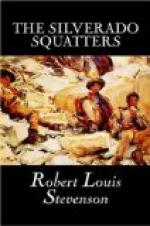Silverado, then under my immediate sway, belonged to one whom I will call a Mr. Ronalds. I only knew him through the extraordinarily distorting medium of local gossip, now as a momentous jobber; now as a dupe to point an adage; and again, and much more probably, as an ordinary Christian gentleman like you or me, who had opened a mine and worked it for a while with better and worse fortune. So, through a defective window-pane, you may see the passer-by shoot up into a hunchbacked giant or dwindle into a potbellied dwarf.
To Ronalds, at least, the mine belonged; but the notice by which he held it would ran out upon the 30th of June—or rather, as I suppose, it had run out already, and the month of grace would expire upon that day, after which any American citizen might post a notice of his own, and make Silverado his. This, with a sort of quiet slyness, Rufe told me at an early period of our acquaintance. There was no silver, of course; the mine “wasn’t worth nothing, Mr. Stevens,” but there was a deal of old iron and wood around, and to gain possession of this old wood and iron, and get a right to the water, Rufe proposed, if I had no objections, to “jump the claim.”
Of course, I had no objection. But I was filled with wonder. If all he wanted was the wood and iron, what, in the name of fortune, was to prevent him taking them? “His right there was none to dispute.” He might lay hands on all to-morrow, as the wild cats had laid hands upon our knives and hatchet. Besides, was this mass of heavy mining plant worth transportation? If it was, why had not the rightful owners carted it away? If it was, would they not preserve their title to these movables, even after they had lost their title to the mine? And if it were not, what the better was Rufe? Nothing would grow at Silverado; there was even no wood to cut; beyond a sense of property, there was nothing to be gained. Lastly, was it at all credible that Ronalds would forget what Rufe remembered? The days of grace were not yet over: any fine morning he might appear, paper in hand, and enter for another year on his inheritance. However, it was none of my business; all seemed legal; Rufe or Ronalds, all was one to me.
On the morning of the 27th, Mrs. Hanson appeared with the milk as usual, in her sun-bonnet. The time would be out on Tuesday, she reminded us, and bade me be in readiness to play my part, though I had no idea what it was to be. And suppose Ronalds came? we asked. She received the idea with derision, laughing aloud with all her fine teeth. He could not find the mine to save his life, it appeared, without Rufe to guide him. Last year, when he came, they heard him “up and down the road a hollerin’ and a raisin’ Cain.” And at last he had to come to the Hansons in despair, and bid Rufe, “Jump into your pants and shoes, and show me where this old mine is, anyway!” Seeing that Ronalds had laid out so much money in the spot, and that a beaten road led right up to the bottom of the clump, I thought this a remarkable example. The sense of locality must be singularly in abeyance in the case of Ronalds.




